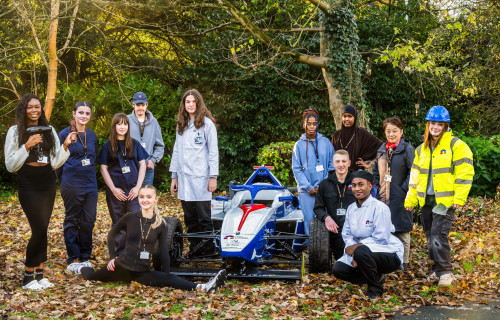T Level: Digital Production, Design and Development Level 3
- Ask a Question
-
Select an Option
-
3
Level
Level 3 -
Duration
2 years -
Start Date
September 2025 -
Venue
City College Norwich campus -
Course Code
A0419
Summary
This T Level is a two year course which has been developed in collaboration with employers and businesses. It has been designed to meet the needs of the digital industry and will prepare you for a career in the Digital Sector. The T level will offer you a mixture of classroom learning and ‘on-the-job’ experience during an industry placement of at least 45 days (315 hours) and is equivalent to three A Levels. The course is split into 2 sections: The Core and the Occupational Specialism.
Core Content (year 1)
You will gain core knowledge and develop a general understanding of digital from the following: how digital technologies impact business; the ethical and moral implications of digital technology; using data in software design; using digital technologies to analyse and solve problems; digital environments, including physical, virtual and cloud environments; emerging technical trends, such as Internet of Things (IoT), Artificial Intelligence (AI), Augmented Reality (AR), Blockchain, 3D printing; legal and regulatory obligations relating to digital technologies; the privacy and confidentiality of personal data; the technical, physical and human aspects of internet security; planning digital projects; testing software, hardware and data and digital tools for project management and collaboration
In addition to the core content, each student will also develop skills in digital production, design and development.
In the second year you will focus on the occupational specialism which allows you to to develop the relevant skills in preparation for your career in the digital industry and will cover: analysing problems, designing software, maintain software, creating software solutions and evaluating its success within a business and legal context.
Why Our College?
Equivalent to 3 A Levels
T Levels are equivalent to three A Levels and are allocated UCAS tariff points.
Developed with industry
T Levels have been designed with leading employers and businesses. They will provide you with the skills to progress to an apprenticeship, university or skilled employment.
Academic and practical
80% will be academic and technical study at college. 20% will be practical experience gained with an employer as part of an industry placement.
Entry Requirements
Achieve 5 GCSE's at grade 4 or above, including English Language. Achieve GCSE Maths at grade 5 or above and, if taken, achieve GCSE Computer Science at grade 5 or above.
Assessment
All assessment is external, written and set by the Awarding Body, Pearson.
- Year 1 Core is assessed with 2 written exams plus an Employer Set project which is a brief that takes the digital user needs for you to problem solve.
- Year 2 Occupational Specialism is assessed by one large ‘Integration Project’ that provides a business problem for you to finish with 2 sets of existing code.
Progression
Students who achieve this qualification could progress to the following, depending on their chosen occupational specialism:
- employment
- higher education
- apprenticeship
Career Progression
The Digital Production, Design and Development T Level is the right pathway if you want to start a career in software production and digital design. Students can progress into roles such as:
- WEB DEVELOPER
- WEB DESIGNER
- SOFTWARE DEVELOPER
- COMPUTER GAMES TESTER
- COMPUTER GAMES DEVELOPER
- E-LEARNING DEVELOPER
- USER EXPERIENCE (UX) DESIGNER
Fees
If you are a UK or home fee status student and aged 16-18 on the 31st August before the start of your course, tuition fees are free.
Where Next?
Why Our College?
Equivalent to 3 A Levels
T Levels are equivalent to three A Levels and are allocated UCAS tariff points.
Developed with industry
T Levels have been designed with leading employers and businesses. They will provide you with the skills to progress to an apprenticeship, university or skilled employment.
Academic and practical
80% will be academic and technical study at college. 20% will be practical experience gained with an employer as part of an industry placement.
Similar Courses
T Level: Digital Support Services Level 3
Level 3, Full Time, 2 years
Delivered at City College Norwich campus
T Level Foundation Year Digital
Level 2, Full Time, 1 year
Delivered at City College Norwich campus
Information Communications Technician Apprenticeship Level 3 Standard
Level 3, Apprenticeship, 2 years
Delivered at City College Norwich campus
Data Technician Level 3
Level 3, Apprenticeship, 2 years
Delivered at City College Norwich campus
Latest News
Norfolk’s largest college of further education, comprised of City College Norwich, Easton College and Paston College, has received a ‘Good’ rating from Ofsted in its latest inspection.
Read more